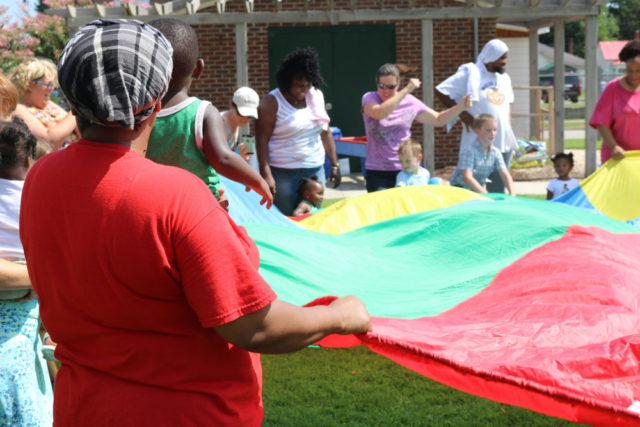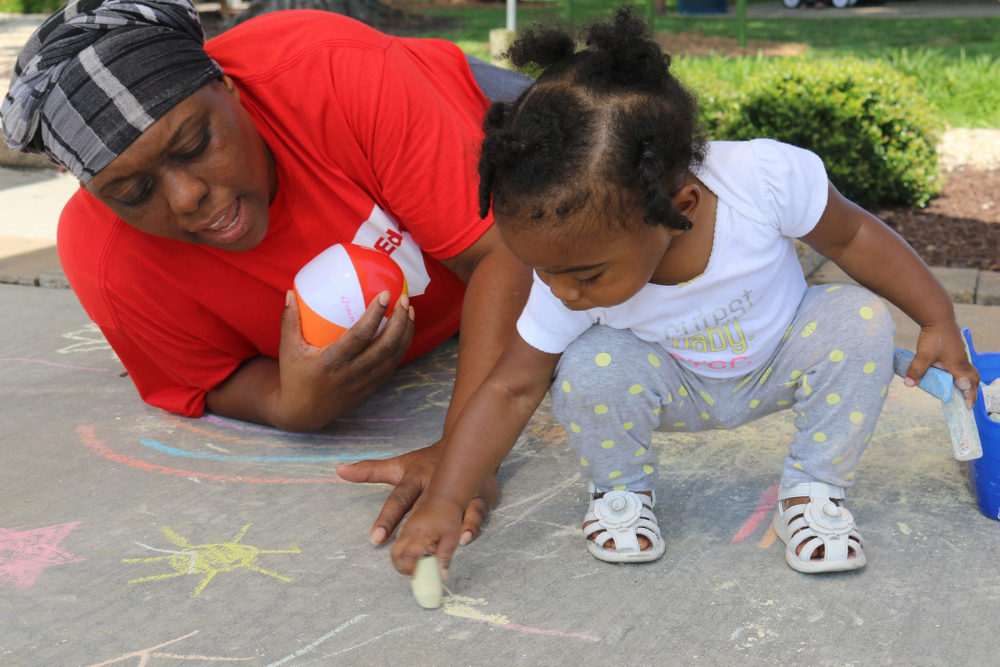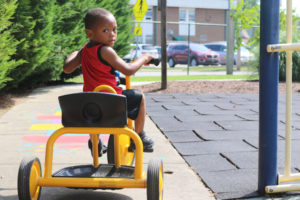
By Liz Bell
Hechinger Report

Rocky Mount, N.C. — On a June morning in this rural eastern North Carolina community, about a dozen families grabbed the edges of a rainbow parachute, making plastic balls bounce in its ripples. Grandparents, parents and children switched between water games, parachute activities and swing-sets spread across a playground.
The fun and games are serious business to the group that runs them, the Down East Partnership for Children, a 25-year-old nonprofit that provides educational and health resources to families of young children in rural Nash and Edgecombe counties. The goal of these meetings is to highlight the importance of basic interactions between parents and their kids.
Playgroups are held at least twice a month for families with children from birth to 5 years old. The meetings are a way for families to meet other families, get connected with resources and prepare children for kindergarten. Families often need support in this part of the state, an area struggling to keep up with the economic growth of the high-tech Triangle region, the metropolitan home of the state capital, Raleigh, about an hour away.
“The ultimate goal of Play and Learn groups is to strengthen [the] parent-child bond,” said Cornelia Singletary, Down East’s family services program manager. “For families who are hesitant about putting their child in a formal child care setting, this is kind of like a little preschool, but you get to be with your child.”
Parent Melanie Wallace, who lives in Nashville, North Carolina, started coming to the playgroups when she heard about the organization from her sister-in-law two years ago. She now brings her three children regularly.
Wallace said the biggest lesson she takes home from these sessions is “the fact that I should be [doing child-directed play] and how to do child-directed play.”
That phrase is heard a lot. Child-directed play is a central aspect of the Kaleidoscope Play & Learn curriculum, originally created in Seattle, Washington, by Child Care Resources, an early childhood resource organization similar to Down East. It is based on the research-backed idea that children should be in charge of their play while their caregivers provide support, rather than a teacher or parent choosing and controlling their activity.
Matthew Speltz, a clinical psychologist at Seattle Children’s Hospital, describes child-directed play as “a special form of one-to-one play between you and your child in which your child directs and leads.” Speltz recommends parents describe how their child plays, imitate that play, repeat what their child says with more detail, provide specific praise and allow their child to play with toys in whatever safe way he or she wants. The strategy discourages parents from giving commands, asking leading questions, quizzing children or promoting competitiveness.
Child-directed play is one of seven components the Kaleidoscope curriculum says should be included at each play meeting. The curriculum encourages a group activity involving both caregivers and children, caregiver training on the importance of play, opportunities for both caregivers and children to interact with each other and chances for caregivers to step into leadership roles.
“It’s not just us being the leader and the star and ‘Hey, it’s all about me,’” Singletary said. “It’s about helping build confidence in parents. There may be a week where the parent chooses to read the story, or bring the snack or help pass out the cups for snack, just giving them some confidence. Because when their child goes to school, they’re going to need to advocate and feel confident that they can talk with their teacher or the principal. We want them to be leaders not only here but also in the community.”
Down East has been hosting different forms of playgroups since the late 1990s. The organization started using the Kaleidoscope model in 2015, after looking for programming that research proved would improve family outcomes. Most community groups using the curriculum are located in Washington, but Alamance County, in the central part of North Carolina, also uses the Kaleidoscope model.

Jennifer Hammett, a Nashville resident and mother of four, has been involved in the playgroups since her oldest son, now 12, was a toddler. As she learned more about the program and saw its impact in her community, she decided to lead her own playgroup. She said she “fell in love” with the program because of the support system it offered to parents.
“A lot of it was about not only the kids’ development, and helping them to grow and develop and be ready for school and meet all those milestones, but also for the parents and teaching the parents how to help their kids, how to interact,” Hammett said. “There’s some parents that come that don’t know what to do with their kids.”
Marletha Muhammad of Rocky Mount wanted her daughter Khanila to interact with children her age before entering kindergarten.
“My 9-year-old, when she started kindergarten, she was in class with two children she had been in playgroup [with] since she was a year old, and she had a best friend already when she went to kindergarten,” Muhammad said. “So to me that’s like the best thing, because they don’t go into kindergarten afraid.”
Down East does more than host playgroups. The organization has been connecting families with educational and health resources for more than two decades, focusing on early childhood development and high-quality preschool access. In 1993, when the organization was incorporated, only 6 percent of young children in Edgecombe County and 7 percent in Nash County were in care settings with the highest-quality rating. In 2017, 88 percent of Edgecombe children and 72 percent of Nash children were in the highest-quality setting available.
Part of that change is due to a shift in how the state issues licenses to child care centers. In 1999, the state started rating centers with one to five stars instead of classifying them as either an A or AA center. Wendy Price, Down East’s program coordinator, said the overwhelming majority of children in Nash and Edgecombe were either in an A-rated center or a non-licensed program before the classification switch. She said the partnership played a big role in providing facility staff with technical assistance so they could improve quality and receive a four- or five-star rating.
“At the local level, DEPC was and still is the only entity that works with child care centers and their staff to maintain/increase quality child care and ensure that staff have the appropriate continuing education, as required by the state,” Sydney Land, Down East’s program development manager, said in an email.
Down East Executive Director Henrietta Zalkind said playgroups are a way to get to know families, gain their trust, and see what other support they might need. Muhammad and Wallace, for example, both participated in another, more intensive parenting program run by Down East called Incredible Years after playgroups brought them to the partnership.
Getting connected with families through playgroups, Zalkind said, also helps DEPC staffers spot any developmental problems early on. Staff members can then notify the appropriate entity of any issues — the Children’s Developmental Services Agency, for children younger than three, or the exceptional children’s director at the public school district.
“We identify a lot of kids through the playgroups who then need to get referred for developmental evaluation,” Zalkind said. “Or people who think that they didn’t want their kids in N.C. Pre-K [the state program] or full-time care and they see the value once they have participated in a playgroup.”
After coming to meetings near the Down East office for years, Hammett decided the program needed to reach even more parents; her new playgroup meets in a library in nearby Nashville, so local parents do not have to drive to Rocky Mount. Hammett said she has seen a bond form between the Nashville parents, who often face similar challenges.
“There’s been a lot of parents connecting so they’re not so alone,” she said. “Sometimes, as you’re raising kids, you kind of get stuck focused on your kids and it can be lonely and you can feel isolated. A lot of them don’t realize what’s available to them.”




